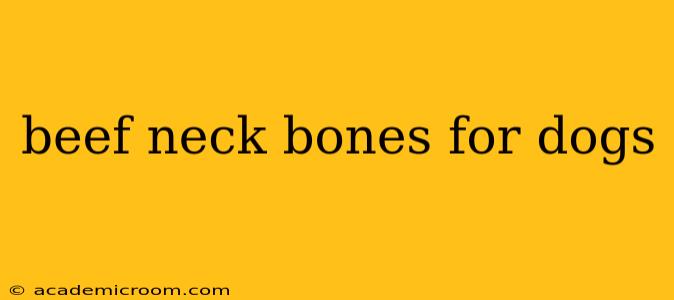Giving your canine companion treats is a great way to bond and reward good behavior. Beef neck bones often appear as a tempting option, promising a flavorful chew. However, before tossing one to your furry friend, let's delve into the pros, cons, and crucial safety considerations surrounding this popular canine treat. Understanding the potential benefits and risks will help you make an informed decision about whether beef neck bones are a suitable addition to your dog's diet.
Are Beef Neck Bones Safe for Dogs?
This is the most crucial question, and the answer isn't a simple yes or no. While beef neck bones can offer certain benefits, they also pose significant risks if not handled and provided correctly. The primary concern is the potential for choking, splintering, and bacterial contamination. Smaller dogs, particularly, are at higher risk due to their smaller size and potentially weaker jaws. Larger, more robust breeds might be better equipped to handle the chew, but even then, supervision is key.
What are the Benefits of Giving My Dog Beef Neck Bones?
Despite the inherent risks, beef neck bones can offer some advantages when given responsibly:
-
Dental Cleaning: Chewing on a beef neck bone can help scrape away plaque and tartar buildup on your dog's teeth, promoting better dental hygiene. This action is similar to how a rawhide chew might benefit dental health.
-
Nutritional Value: Beef neck bones contain some valuable nutrients, including collagen and other proteins. However, it’s important to remember that these bones are not a complete nutritional source and shouldn't replace balanced dog food.
What are the Risks Associated with Beef Neck Bones?
The potential dangers significantly outweigh the benefits if proper precautions aren't taken:
-
Choking Hazard: Large bone fragments can easily lodge in a dog's throat, causing choking and potentially requiring emergency veterinary intervention.
-
Splintering: Bones can splinter, creating sharp fragments that can lacerate the mouth, throat, or digestive tract. This is especially true with cooked bones, which are more brittle.
-
Bacterial Contamination: Raw bones can harbor bacteria like Salmonella or E. coli. While your dog's stomach acid often kills these bacteria, there's still a risk, particularly for puppies or dogs with compromised immune systems.
-
Constipation: Excessive consumption of bone can lead to constipation due to the indigestible nature of bone.
-
Pancreatitis: In some cases, excessive fat from the marrow can trigger pancreatitis.
How Can I Safely Give My Dog Beef Neck Bones?
If you decide to give your dog beef neck bones, prioritize safety:
-
Supervision is crucial: Never leave your dog unsupervised while chewing on a bone.
-
Choose the right size: Select a bone that is appropriately sized for your dog's breed and size. A bone that is too large can present a choking hazard, while one too small can be swallowed whole.
-
Consider the bone's condition: Avoid cooked bones, as they are brittle and more likely to splinter. Raw bones are generally safer, but still require careful monitoring.
-
Remove the bone if it becomes too small: Once the bone becomes small enough to be easily swallowed, take it away.
What are Some Alternatives to Beef Neck Bones?
Numerous safer alternatives offer similar benefits without the same risks:
-
Dental chews: These are designed for chewing and help maintain dental health.
-
Rawhide chews: These offer a durable chew but should always be supervised.
-
Beef bully sticks: These are dried beef pizzles that offer a long-lasting chew.
-
Nylabones: These are durable, long-lasting chew toys.
Can Puppies Have Beef Neck Bones?
No, puppies should never be given beef neck bones. Their smaller size and developing digestive systems make them particularly vulnerable to the risks associated with bone consumption. Stick to puppy-appropriate chews.
Are Cooked Beef Neck Bones Safe for Dogs?
Cooked beef neck bones are generally considered unsafe for dogs. The cooking process makes them brittle and more prone to splintering, increasing the risk of internal injuries.
My Dog Ate a Beef Neck Bone – What Should I Do?
If your dog has eaten a beef neck bone and you're concerned, contact your veterinarian immediately. They can advise you on the best course of action depending on your dog's size, the size of the bone, and any symptoms your dog is exhibiting. Don't hesitate to seek professional veterinary assistance.
Remember, responsible pet ownership involves making informed choices about your dog's diet and treats. While beef neck bones can potentially offer some benefits, the risks significantly outweigh the rewards for many dogs. Always prioritize your pet's safety and well-being.
